

Uh oh...
It appears that you're using a severely outdated version of Safari on Windows. Many features won't work correctly, and functionality can't be guaranteed. Please try viewing this website in Edge, Mozilla, Chrome, or another modern browser. Sorry for any inconvenience this may have caused!
Read More about this safari issue.

In March 1912, Floyd Ellis Vaughan (later, he changed his name to Joseph Floyd Vaughan) was born in Arkansas almost by chance. His birth happened to be during one of the brief periods when Robert and Laura (Denney) Vaughan called Clifty, Arkansas, their home. Like many Arkansas families, the Vaughans moved frequently between the Boston Mountains and Southern California looking for work.
A month after Floyd Vaughan was born in Madison County, Carlos Alton Biggs was born in rural Faulkner County just west of Greenbrier. Unlike many of their neighbors, Thomas and Nora Biggs stayed on their farm in the foothills of the Ozarks surrounded by an extended family. Thomas took on a roofing job to make ends meet, and the Biggs remained Arkansans for life.
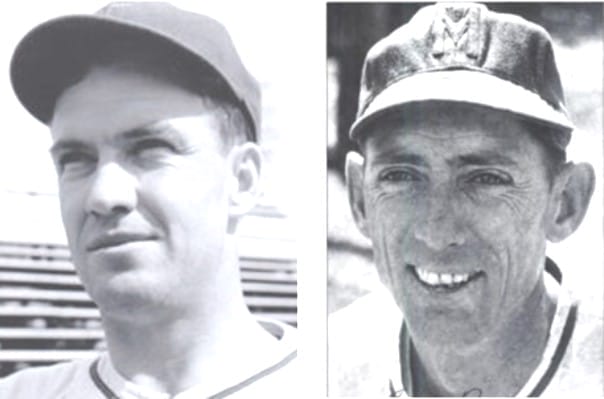
Arky Vaughan, left and Arky Biggs right
It is unlikely the two young men were acquainted, although they shared a common occupation, with the same job description and often for the same employer. The two Arkansans played more than 4,000 professional baseball games with a shared nickname. “Arky” Vaughan would become one of the most outstanding major leaguers of the 20th century and “Arky” Biggs would play 2,058 minor league games and never play in the majors.
The major league season of 75 years ago was a remarkable time in Arkansas baseball history. Johnny Sain of Havana, Arkansas, was chosen by the Sporting News as the best pitcher in the major leagues, and a left-hander born in the Arkansas Delta named Gene Bearden was the hero of the 1948 World Series. Preacher Roe from Viola was making a name for himself in Brooklyn, and George Kell of Swifton was named as the outstanding third baseman in the major leagues.
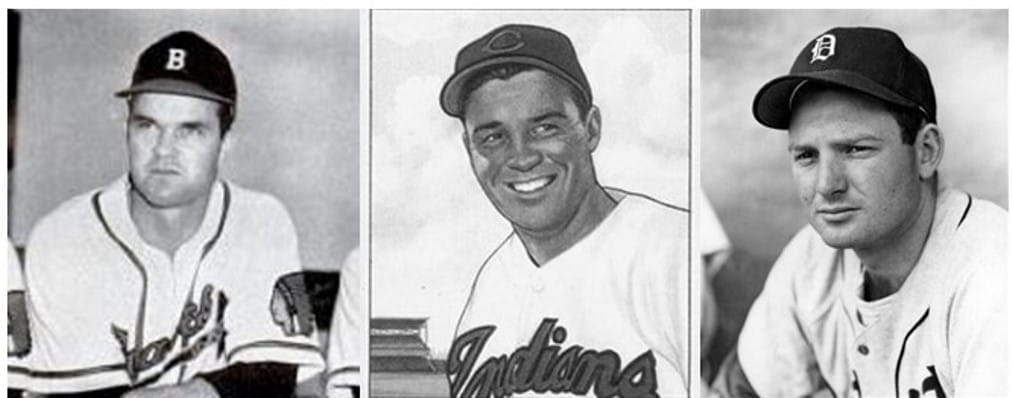
Johnny Sain, Gene Bearden, George Kell
In a related event that was relatively ignored in national baseball publications, Arky Vaughan of the Brooklyn Dodgers retired at age 36. It would take some retrospection for baseball historians to realize that Vaughan was the most outstanding Arkansas big leaguer in the first half of the 20th century.
In another ignored story, Arky Biggs, the player-manager of the Phoenix Senators of the Arizona-Texas League, broke his collar bone in a baserunning collision late in the season. The team had a special night for Biggs on September 1 to help with his medical expenses. At age 36, Biggs had batted .331 and driven in 119 runs, but Phoenix finished the season fifth in a six-team league and Biggs was looking for a job.
Although he did not return to Arkansas often, Arky Vaughan represented his birth state every day. It was a time when families from places like Clifty headed to California looking for a new start during some of the state’s most difficult times. Migrants from Arkansas were often given the somewhat derisive nickname “Arky.” Young Floyd apparently preferred “Arky” to “Floydy Boy,” the name his family called him. Vaughan was “Arky” for the rest of his life. On his baseball cards, Hall of Fame plaque, and every autograph he signed Floyd Vaughan was always “Arky.”
Young Arky soon became a youth sports sensation in Fullerton, California. Although his first love was baseball, he was outstanding in whatever sport was in season. One of his less-noticed teammates on the local peewee football team was a young fellow at the end of the bench named Richard Nixon. By 1930, his senior year at Fullerton High, Vaughan could name his athletic future. He led the Fullerton High Indians to league titles in football, basketball, and baseball. After starring on the local men’s semi-pro team, Vaughan signed a baseball contract after his 18th summer.
How good was young Floyd Vaughan? He was good enough that the scout that signed him asked the Pittsburgh Pirates organization to allow him to be the manager of Vaughan’s first minor league team. That next summer, the 19-year-old shortstop led the Western League in runs scored, batted .338, hit 21 home runs, and hit 16 triples. The Pirates had seen enough. For the next ten seasons, he would be the best shortstop in the major leagues.
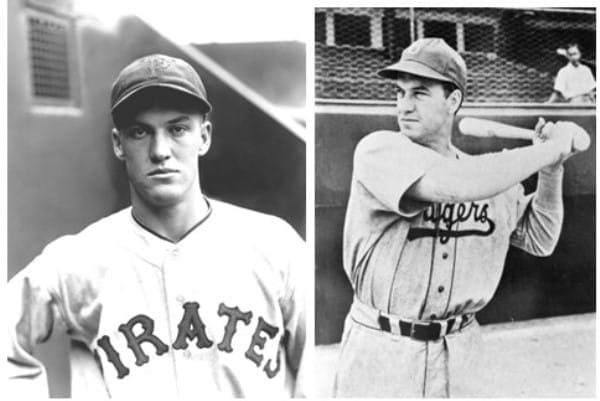
A young Arky Vaughn with the Pirates and in 1948 with the Dodgers
Vaughan was outstanding from the start. In his first six big-league seasons, he batted .336 with 53 home runs. He averaged 72 RBIs per year, 12 three-base hits per season, and almost 85 runs scored during a historic six-year stretch. By 1937, Arky Vaughan had been a National League All-Star four times. After the 1935 season, the Sporting News named him their National League Most Valuable Player.
Meanwhile, in the Pittsburgh minor league system, the Pirates had an up-and-coming young shortstop with the coincidental nickname Arky Biggs. Biggs was an All-Star in Class B the South Atlantic League (SALLY League). He had batted .313 the previous season in Class C and driven in 107 runs. A promotion to Savannah for the 1937 season had not slowed down his obvious ascension toward the majors. He was hitting about .285 going into September and leading the team in runs scored and stolen bases. There was one problem with Biggs’ place in the Pirates organization. The player holding down his position with the big-league Pirates was the best shortstop in the major leagues.
Despite the obstacle that the Pirates did not need a new shortstop, early in September Arky Biggs got the letter. He was to report to the Pirates when his season ended in Savannah. The Arkansas Gazette announced on September 7 that “another Faulkner County baseball player is headed for the big leagues.” He would report when his season was over.
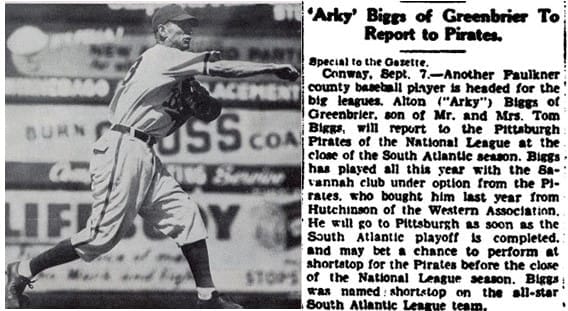
Arky Biggs was called to the major leagues in September 1937
In an ironic inconvenience that would, in hindsight, become a tragedy, Biggs’ team not only won the league playoff but as SALLY League Champs, the Senators were required to play in something called the “Championship of the South” against the winner of the Class B Southeastern League. When Savannah was finally eliminated in late September, the Pirates’ season was a weekend from being over. Biggs never made the trip. Of course, a player with his potential would surely get another shot soon. The second call never came.
After ten outstanding years in Pittsburgh, Vaughan was traded to the Brooklyn Dodgers in 1941. In the previous season, injuries had limited Vaughan to 106 games, but he had led the team in batting average with an excellent .318 mark. Local sportswriter Fred Lieb lamented, “Many of the Pirate faithful shook their heads. They didn’t want to see Arky get away.”
Arky made the All-Star team for the ninth consecutive time in 1942. This time as a Brooklyn Dodger. The following year, he led the National League in Runs Scored and Stolen Bases. Vaughn sat out the next three years over a disagreement with manager Leo Durocher, before returning for two final seasons in the big leagues. In the 1947 and 1948 seasons, he played alongside Jackie Robinson during one of baseball’s most historic periods. Robinson would later recall, “He was one of the fellows who went out of his way to be nice to me when I came in here as a rookie. Believe me, I needed it. He was a fine fellow.”
Arky Vaughan played one more minor league season in 1949 with the San Franciso Seals in the Pacific Coast League. Playing in the PCL allowed him to be near his home and his favorite Northern California fishing locations. Unlike many players who remain near the game after retirement, Arky Vaughan returned to his home in Northern California and was seldom seen around pro baseball events.
Six Arkansas-born men have been voted into the Baseball Hall of Fame. Arky Vaughan and Waldo’s Travis Jackson were the last two Arkansans inducted in the summer of 1985. Perhaps overlooked because he died young or because he was not active on the baseball scene after retiring, it took 35 years for baseball to realize the significance of Arky Vaughan.
In his 2021 bestseller The Baseball 100, highly respected list maker Joe Posnanski ranks Arky Vaughan as the 61st best baseball player at any position. That lofty spot in Posnanski’s honor roll ranks above such notables as Sandy Koufax and shortstops named Derek Jeter and Ozzie Smith.
In the summer of 1951, Arky Biggs broke his arm in a pileup at second base. He returned to his Greenbrier farm, where he spent the remainder of his life. He played in 2,058 professional games. The most games played by an Arkansas-born player who did not appear in a single big-league game. Arky Biggs died in Greenbrier in 1981.
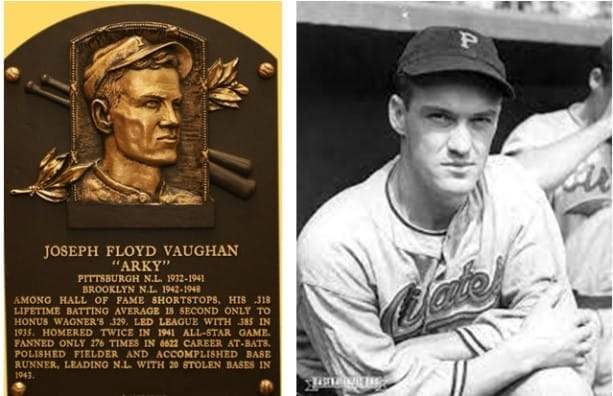
Arky Vaughan was inducted into the Baseball Hall of Fame in 1985
Tragically, Arky Vaughan drowned in a fishing accident in August 1952. He was 40 years old. Although his credentials were undeniable, his biography became an obscure story in baseball history. It would take the Baseball Hall of Fame 33 years to remember Arky Vaughan.
He played in a golden era of baseball — in the time of Ruth and Gehrig and Williams and Jimmie Foxx and DiMaggio and the rest — and he was a big star. He made the All-Star team every year, he won a batting title, he led the league in multiple categories throughout his career and he came close to winning an MVP multiple times while playing for mediocre Pirates teams. He even played in a World Series for Jackie Robinson’s Brooklyn Dodgers. And yet, nobody knows him. –– Bestselling baseball writer, Joe Posnanski
Join the Conversation
Leave a Comment
2 responses to “Arkansas Baseball Stars Share Arky Nickname”
 Leave a Reply
Leave a Reply
We do the work.
You check your email.
Sign up for our weekly e-news.
Get stories sent straight to your inbox!
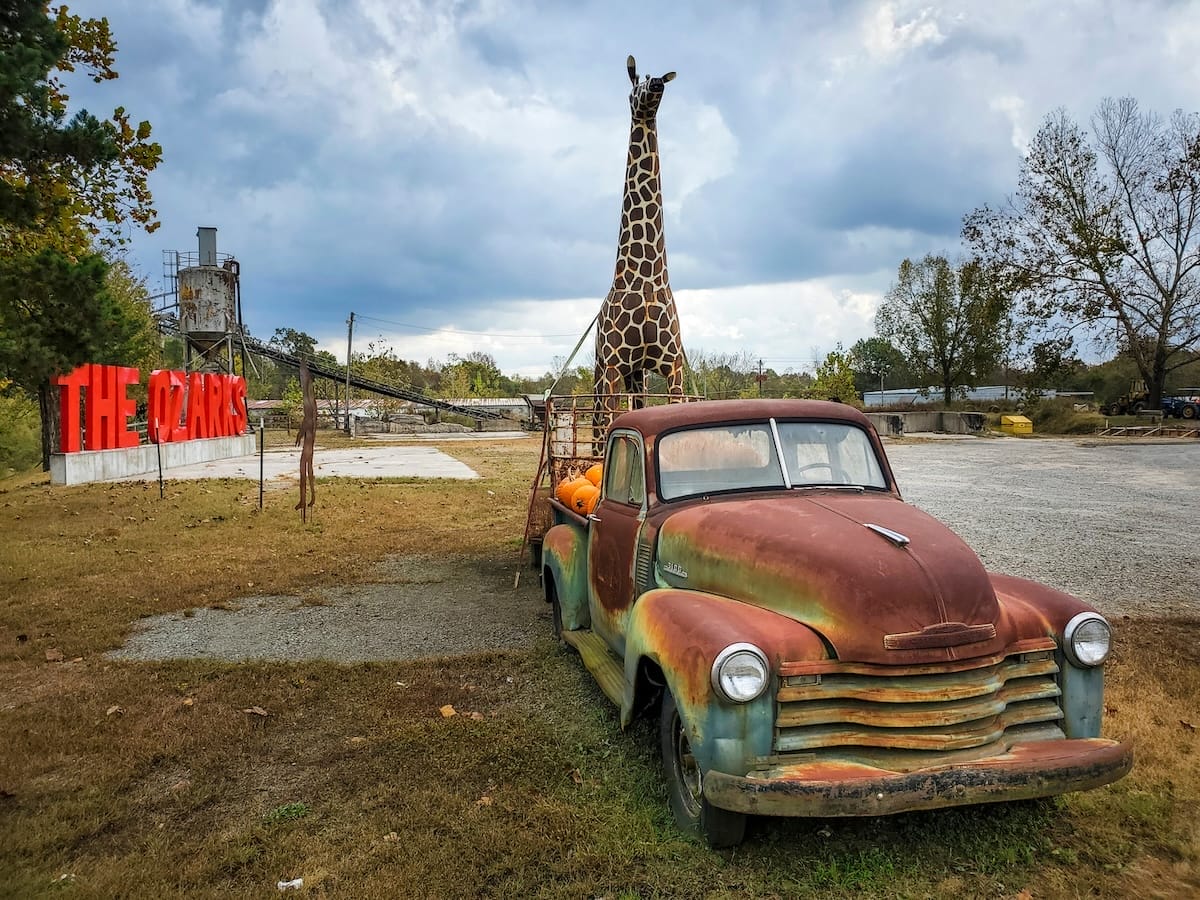






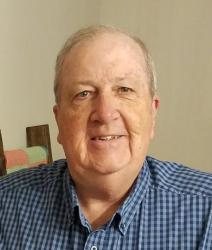
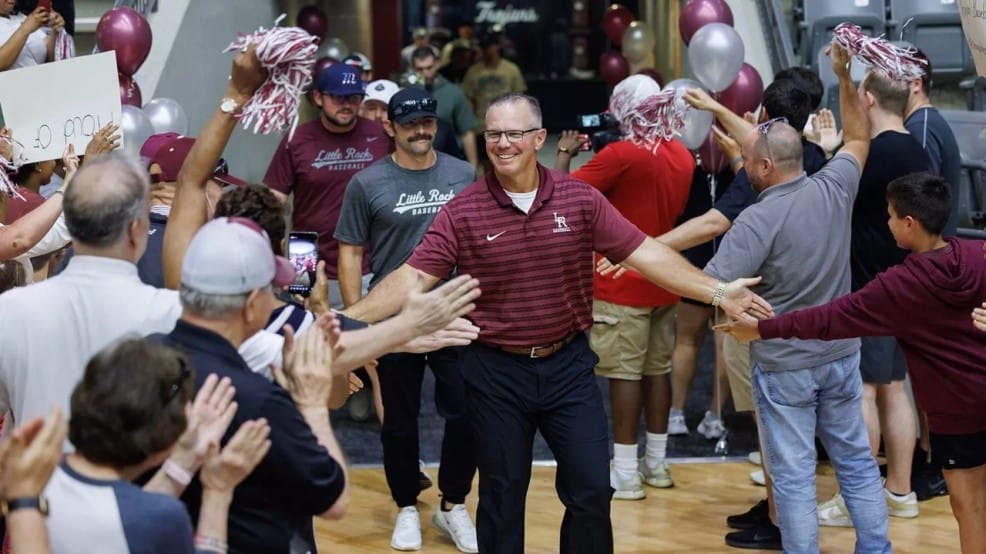
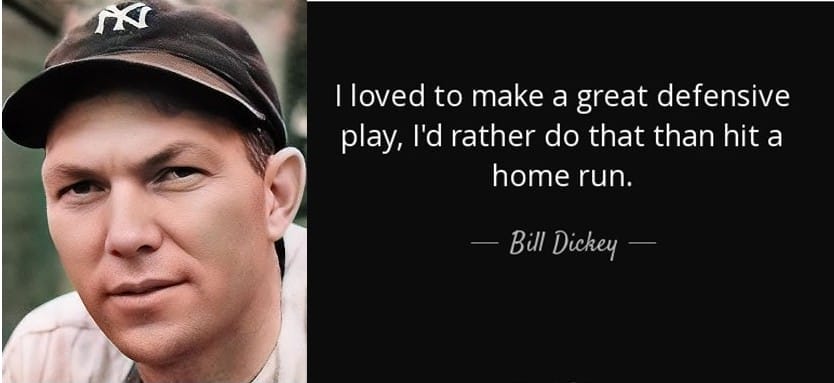
 Leave a Reply
Leave a Reply
Johnny Sain’s nephew, Tommy Sain, was a member of the Razorback Football National Championship team in 1964.
Nice story.